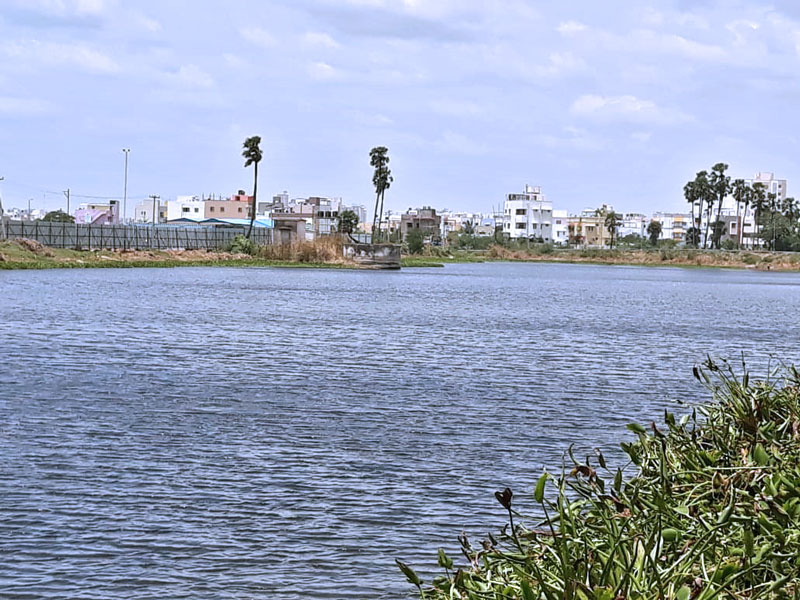
When RIPN Shekhar Mehta was recently taken around the Puduthangal Lake in Tambaram, Chennai, around 30 acres in extent, which the Rotary Club of Madras, RID 3232, has renovated in partnership with a corporate, and he saw it filled with water and heard the enthusiastic response of a local beneficiary that thanks to this project “all our wells are full”, he urged the club to renovate 100 lakes!

“When he said this, my immediate response was ok, we will do it,”, smiles past president of the club P N Mohan, who started the lake renovation project when he was club president in 2017.
And the same evening, when his club, a vintage club which completed 90 years last year, along with other clubs, hosted a reception for Mehta, Mohan told the other club members that he would need their support if this number was to materialise. But he points out that it will serve a better purpose if instead of the number of lakes, Rotarians could concentrate on the acreage covered. “For instance, the next lake RC Madras is going to take up is a huge one, covering an area of 250 acres,” he says.
It all began in 2017 when Chennai was reeling under an acute water shortage and the club decided to take on waterbodies restoration work, beginning with the first lake, Puducherry Keni Lake near Sholinganallur spread over 10 acres. “This lake had disappeared under a bed of hyacinth which had resulted in the release of untreated sewage into the lake,” recalls Mohan.
Around this time, he met Jayshree Vencatesan from the NGO Care Earth Trust, which has a vast experience in lake restoration work. The club hired her services, and the restoration process began with the removal of water hyacinth from the tank, followed by dredging and desilting of the lake. It took about five months to remove the water hyacinth from the tank. Once the dredging work was completed, the bioremediation work began. For this an enzyme solution, mixed with palm jaggery was used. The tank was divided into eight grids and the solution was sprayed on each grid; this spraying helped to check reappearance of water hyacinth, he explains.
The Puducherry Lake had disappeared under a bed of hyacinth which had resulted in the release of untreated sewage into the lake.
Once this process was over, water samples were collected from the tank and tested. It was found that the quality of water had indeed improved. “Slowly birds started arriving at the tank. First, the pelicans came, followed by other birds such as white-breasted water hen, purple swamp hen, common coot, little egrets, pond heron, cattle egrets, little grebe, pled kingfisher and many more. This lake is now brimming with freshwater and meeting the drinking and other water needs of about 7,000 people living around the lake.”
The cost to hire the NGO and complete the work was ₹15 lakh; “I put on my begging cap and got the money from the industrial house Rane in Chennai,” says Mohan.

Once the Puducherry Lake was done, the club undertook another project in August 2019 — restoring and rejuvenating the Puduthangal Lake in Tambaram. The restoration work started in August 2019, and is expected to be completed by January-end. This will benefit about 50,000 people. “We took RIPN Mehta here and he was very happy that there was freshwater here and the local community was so grateful to Rotary.” Their wells are full, there is adequate drinking water and as this is a rainfed lake, the Rotarians have provided piped inlets to bring in water from the nearby higher areas.
On the maintenance of the lake, he says, “We’ve hired a person on a monthly salary to check there is no throwing of garbage or seeping in of sewerage water.” The community has formed an association, and an MoU has been signed with the club to maintain the lake, and keep the place clean. Mohan explains that lakes are restored in two phases; first being rapid assessment essential for restoration, followed by the actual restoration work.
In our club we always have consensus of the past, present and future leaders, without which there is no point in doing a project.
The restoration of this lake cost around ₹45 lakh, and this time the Sun Foundation came on board to help with the funding. “I must admit that it is such a generous support from our corporate partners which has made it possible to carry out such projects,” adds Mohan.
With the past, incoming and future club presidents on board, the project continuity is assured. “In our club we always have consensus of the past, present and future leaders, without which there is no point in doing a project,” he says.
Now a third lake has been identified — the Madambakkam Lake in Chennai which covers a mammoth area of 250 acres. The project cost is ₹1.5 crore and will be met through a global grant, for which an application is already under process.





